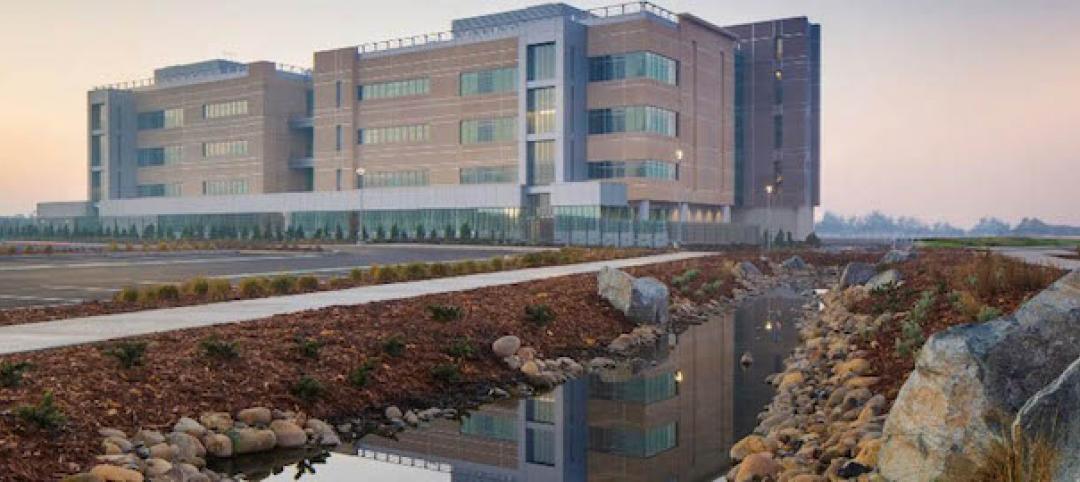The Green Building Initiative (GBI) today announced the launch of a new certification program specific to design of interiors of commercial and institutional buildings, according to GBI president Jerry Yudelson.
The new program, Green Globes for Sustainable Interiors, focuses exclusively on the sustainable design and construction of interior spaces in non-residential buildings and can be pursued by both building owners and individual lessees of commercial spaces. When pursuing Green Globes for Sustainable Interiors certification, tenants can focus on both designing new and/or improving their existing interior space to Green Globes standards without the need to certify an entire building.
“One of the aspects that makes Green Globes for Sustainable Interiors so versatile–and practical–is that it enables tenants to certify the specific environmental and sustainability attributes of the space they lease,” Yudelson said. “Other certifications include aspects of the entire building and surroundings, and as a result, tenant improvements can be penalized for conditions they do not control.”
As with all Green Globes rating programs, Green Globes for Sustainable Interiors utilizes a third-party assessor who reviews actual building characteristics and documentation. However, Green Globes for Sustainable Interiors has no prerequisites, which – if required – could unfairly penalize building projects and possibly result in their inability to use a green building rating system. The Green Globes for Sustainable Interiors program requires that interior designers and tenant project teams address only those sustainability criteria within their “domain of influence.”
The Green Globes 1,000-point scale utilizes weighted criteria; the assigned number of points for individual criteria reflects their relative impact and/or benefit to sustainability of the tenant improvements. Green Globes for Sustainable Interiors includes six environmental assessment areas: Project Management, Energy, Water, Materials & Resources, Emissions and Other Impacts, and Indoor Environment.
In addition to assessing all elements of an interiors project, Green Globes for Sustainable Interiors emphasizes the key performance indicators (KPIs) of energy, materials and indoor environment. Green Globes for Sustainable Interiors does not deal with site characteristics, instead focusing all criteria on parameters within the scope of a typical tenant improvement, resulting in lower costs for certification.
Similar to the Green Globes for New Constuction program, Green Globes for Sustainable Interiors includes a dual-pathway approach to materials choices for interior fit-outs, utilizing either lifecycle assessment (LCA) or Environmental Product Declarations (EPDs). Interior designers are rewarded for using multi-purpose furniture, modular furniture and casework solutions, and other interior fit-out elements that can be easily reconfigured. Additional points are awarded for reuse of existing interior fit-outs, including finishes, furnishings, and other non-structural elements. The Green Globes for Sustainable Interiors rating system also includes direct reference to other industry standards such as the new “level” sustainability standard of the Business and Institutional Furniture Manufacturers Association (BIFMA).
“The Green Globes for Sustainable Interiors program will be especially attractive to tenants who want to improve their workspace sustainability in situations where a landlord does not plan to address changes in other tenant or common spaces,” Yudelson said.
For more information on Green Globes for Sustainable Interiors visit http://www.thegbi.org/green-globes/sustainable-interiors.shtml, or download a PDF on the program here: http://thegbi.org/URL
About the Green Building Initiative
The GBI is a nonprofit organization and American National Standards Institute (ANSI) Standards Developer dedicated to accelerating the adoption of green building practices. Founded in 2004, the organization is the sole U.S. provider of the Green Globes® and federal GBI Guiding Principles Compliance building certification programs. To learn more about opportunities to become involved in the GBI, contact Jerry Yudelson or visit the GBI website, www.thegbi.org.
Related Stories
Architects | Jun 4, 2018
Changing the way we think about water and design
We have several gaps between the need and desire to have abundant, accessible, clean water and the reality of dealing with on-going and increasing water shortage crises.
Libraries | Jun 1, 2018
New library offers a one-stop shop for what society is craving: hands-on learning
Beyond lending books and DVDs, the Elkridge (Md.) branch library loans household tools like ladders, wheelbarrows, and sewing machines.
| May 30, 2018
Accelerate Live! talk: Seven technologies that restore glory to the master builder
In this 15-minute talk at BD+C’s Accelerate Live! conference (May 10, 2018, Chicago), AEC technophile Rohit Arora outlines emerging innovations that are poised to transform how we design and build structures in the near future.
| May 30, 2018
Accelerate Live! talk: Why the AEC industry must adapt to the Internet of Things boom
In this 15-minute talk at BD+C’s Accelerate Live! conference (May 10, 2018, Chicago), building systems expert Jeff Carpenter explores established and emerging IoT applications for commercial and institutional buildings, and offers a technology roadmap for navigating the IoT landscape.
| May 30, 2018
Accelerate Live! talk: T3 mass timber office buildings
In this 15-minute talk at BD+C’s Accelerate Live! conference (May 10, 2018, Chicago), architect and mass timber design expert Steve Cavanaugh tells the story behind the nation’s newest—and largest—mass timber building: T3 in Minneapolis.
| May 30, 2018
Accelerate Live! talk: From micro schools to tiny houses: What’s driving the downsizing economy?
In this 15-minute talk at BD+C’s Accelerate Live! conference (May 10, 2018, Chicago), micro-buildings design expert Aeron Hodges, AIA, explores the key drivers of the micro-buildings movement, and how the trend is spreading into a wide variety of building typologies.
Market Data | May 29, 2018
America’s fastest-growing cities: San Antonio, Phoenix lead population growth
San Antonio added 24,208 people between July 2016 and July 2017, according to U.S. Census Bureau data.
| May 24, 2018
Accelerate Live! talk: The rise of multi-user virtual reality
In this 15-minute talk at BD+C’s Accelerate Live! conference (May 10, 2018, Chicago), two of CannonDesign's tech leaders present their early findings from pilot testing multi-user VR technology for AEC project coordination.
| May 24, 2018
Accelerate Live! talk: The next frontier of post-occupancy evaluations
In this 15-minute talk at BD+C’s Accelerate Live! conference (May 10, 2018, Chicago), ZGF Architects’ Chris Chatto outlines methods for conducting meaningful, holistic evaluations from design to occupancy.
| May 24, 2018
Accelerate Live! talk: Security and the built environment: Insights from an embassy designer
In this 15-minute talk at BD+C’s Accelerate Live! conference (May 10, 2018, Chicago), embassy designer Tom Jacobs explores ways that provide the needed protection while keeping intact the representational and inspirational qualities of a design.









